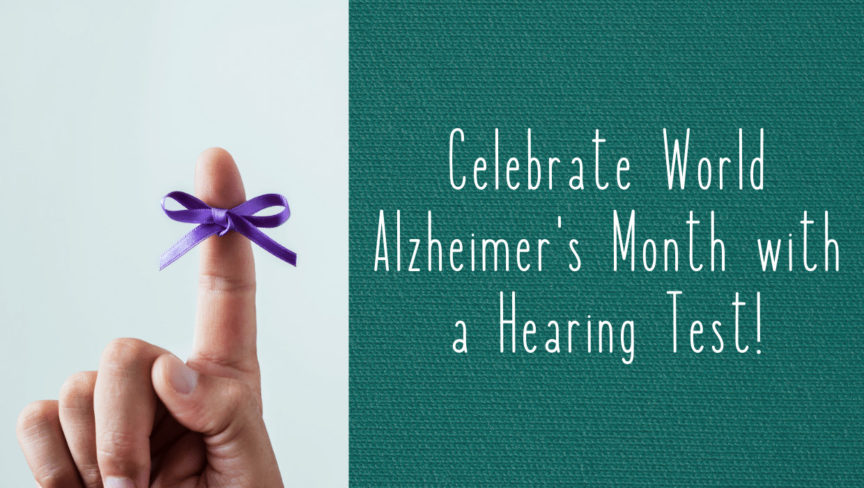- The Harm of Smoking to the Ears - April 9, 2025
- The Importance of Exercise for Hearing Health - March 11, 2025
- Movie Theaters and Hearing Aids - February 13, 2025
September is World Alzheimer’s Month! Launched in 2012, this month centers on raising global awareness about dementia. Dementia is an umbrella term for numerous medical conditions that cause cognitive decline. This results in a reduced ability to make decisions, remember, concentrate, problem solve etc. which limits a person’s capacity to navigate daily life independently. You may have heard of at least one type of dementia – Parkinson’s, Huntington’s, Lewy body, vascular, and Alzheimer’s. Alzheimer’s is the most common form, accounting for 60-80% of all dementia that people experience. According to the Alzheimer’s Association, nearly 6 million people in the U.S. have Alzheimer’s, a number that is expected to more than double by 2050 (to 13.8 million).
Currently there is no cure for Alzheimer’s which has an average life span of 4 to 8 years after diagnosis. There is significant emphasis on finding ways to prevent or delay the development of Alzheimer’s. Research has shown that addressing hearing loss can reduce the risk of cognitive decline.
Understanding Hearing Loss
Hearing loss is the third most common chronic medical condition that older adults experience. Impacting over 40 million people in the U.S., impaired hearing is a public health epidemic. It can be caused by a range of factors including:
- Environmental exposure to loud noise: sound above 85 decibels is potentially harmful to hearing. We can easily absorb high levels of sound at concerts, at work, watching a sports game, listening to music through headphones etc.
- Existing medical conditions: such as hypertension, cardiovascular disease, diabetes, and obesity can contribute to hearing loss by impacting blood flow, causing inflammation, arteries etc.
- Genetic history: family history of hearing loss is a factor in developing impairment because genes impacting the auditory system can be inherited.
- Aging: known as presbycusis, age related hearing loss can be caused by structural changes to the ear which can happen during the aging process, or specific medical conditions that older adults are at higher risk of.
Hearing loss typically occurs gradually over time which is why it is often overlooked for quite some time. It is important to be aware of the symptoms which include the following:
- A buzzing, ringing, clicking like noise in one or both ears, referred to as tinnitus
- Increasing volume on electronic devices
- Asking others to repeat themselves, or needing people to speak loudly and/or slowly
- Sound is muffled and identifying individual words is challenging
- Difficult hearing, especially in environments with background noise
- Ability to hear more clearly in one ear over the other
- Frequently experiencing confusion during a conversation
These symptoms can be mild to severe and take a toll on communication. Strained communication impacts job performance, relationships, and well-being. Untreated hearing loss can exacerbate these symptoms and also contribute to other medical conditions including Alzheimer’s.
Alzheimer’s & Hearing Loss
Extensive research has established a significant correlation between Alzheimer’s and hearing loss. Sharing a few similarities, both conditions:
-
- Age is the strongest predictor, older adults are disproportionately impacted
- Hearing loss:
-
-
-
- 25% of adults 65-74
- 50% of adults 75 and older
-
-
- Alzheimer’s
-
-
- 1 in 10 adults 65 and older
- 80% are 75 and older
-
- Permanent conditions that more often happen gradually
- Share a few symptoms: confusion, strained communication, social withdrawal
In investigating this link, studies have found that hearing loss can dramatically accelerate the development of cognitive decline. Mild hearing loss can double the risk and moderate hearing loss can triple the risk of dementia. This also highlights that the more severe the hearing loss, the likelier cognitive decline is. While how this is caused continues to be examined, researchers have suggested a few theories including that hearing loss can cause cognitive overload, and/or inactivity in some areas which impacts overall cognitive function.
Get Your Hearing Tested
Early detection and treatment of hearing loss can profoundly improve your health. The first step is to schedule an appointment for a hearing test with our team. Hearing tests are a painless way of measuring your hearing ability in both ears. Fortunately, there are effective ways that hearing loss is treated which can potentially help to reduce your risk of developing Alzheimer’s disease!

